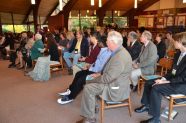By Brandon Huck, UNA-SNY Energy Project
On April 4th, 2013, the Public-Private Alliance Foundation (PPAF) convened a consultation at the United Nations (U.N.) to provide an update on its pilot project involving the use of ethanol cookstoves and fuels in Haiti. The meeting was co-sponsored by PPAF and the UN Office for Partnerships, and included other interested parties, such as Path To Haiti Business Consulting LLC, SImACT, Inc., and Project Gaia, Inc. The United Nations Association Southern New York State Division and its Energy Project supported the event.
The consultation brought together actors from a variety of sectors and diverse organizations with a goal of discussing the pilot project and coming to agreement on next steps and priorities for its expansion. In addition, the meeting functioned as a vehicle to increase awareness and knowledge among its participants of the benefits and potential of ethanol cookstoves and clean cooking fuels as alternatives to traditional cooking methods and materials in Haiti. In that country, the majority of cooking is still done using charcoal and wood-burning stoves, practices which often result in unclean and unsafe conditions that disproportionately and negatively affect mothers and children by exposing them to serious health and safety risks, such as a higher incidence of respiratory ailments and diseases.
Participants in the consultation met first in a plenary session and then in small groups to discuss the specific challenges and opportunities associated with PPAF’s pilot project, as well as the possibility of broader commercialization of ethanol cookstoves in Haiti. Several presenters referenced the pilot’s unique status as the first project of its kind in Haiti. Through relations with Dometic Group AB – a manufacturer of ethanol cookstoves Project Gaia, Inc., which donated an initial supply of stoves for the pilot –and other partners on the ground in Haiti, PPAF and Path to Haiti have been able to introduce hundreds of Haitians to the ethanol cookstoves. The pilot participants and observers have included low-income mothers, community organization representatives, small business owners, government officials, and employees at a participating hotel, providing for diverse perspectives on the efficacy and usability of the stoves and fuel.
Participants in the consultation learned about the many advantages offered by ethanol cookstoves. One is the ability to tap into a growing desire by Haitians at all societal levels to overcome the poverty-respiratory disease-deforestation trap caused by Haiti’s heavy reliance on cooking with wood or charcoal. As an alcohol-based fuel, ethanol is considered a ‘clean fuel’ and offers a healthier alternative to cooking with petroleum-based fuels. The ethanol cookstoves take less time to cook food versus the traditional methods employed. In addition, clean cookstove models would leverage existing equipment and technology in Haiti, and create a new value stream for farmers and distillers if mass production of ‘fuel-grade’ ethanol alcohol could be made viable.
From an economic perspective, the commercialization of ethanol cookstoves might benefit Haiti more generally. For one, it could spur increased demand and innovation in sugar cane production, which is currently imported in larger quantities than it is grown locally – a surprising fact given Haiti’s long history of sugar cane farming. Furthermore, the transition to ethanol cookstoves may provide an attractive investment option to the Haitian diaspora, who annually give approximately $3 billion to family and friends in Haiti and support various social causes and business enterprises.
Lastly, the pilot project supports the goal of the Global Alliance for Clean Cookstoves, which aims for100 million households worldwide to adopt clean and efficient stoves and fuels by the year 2020.




